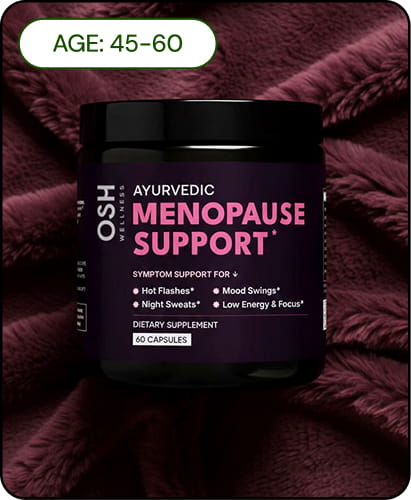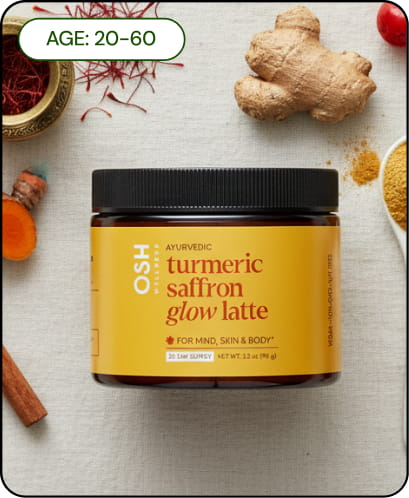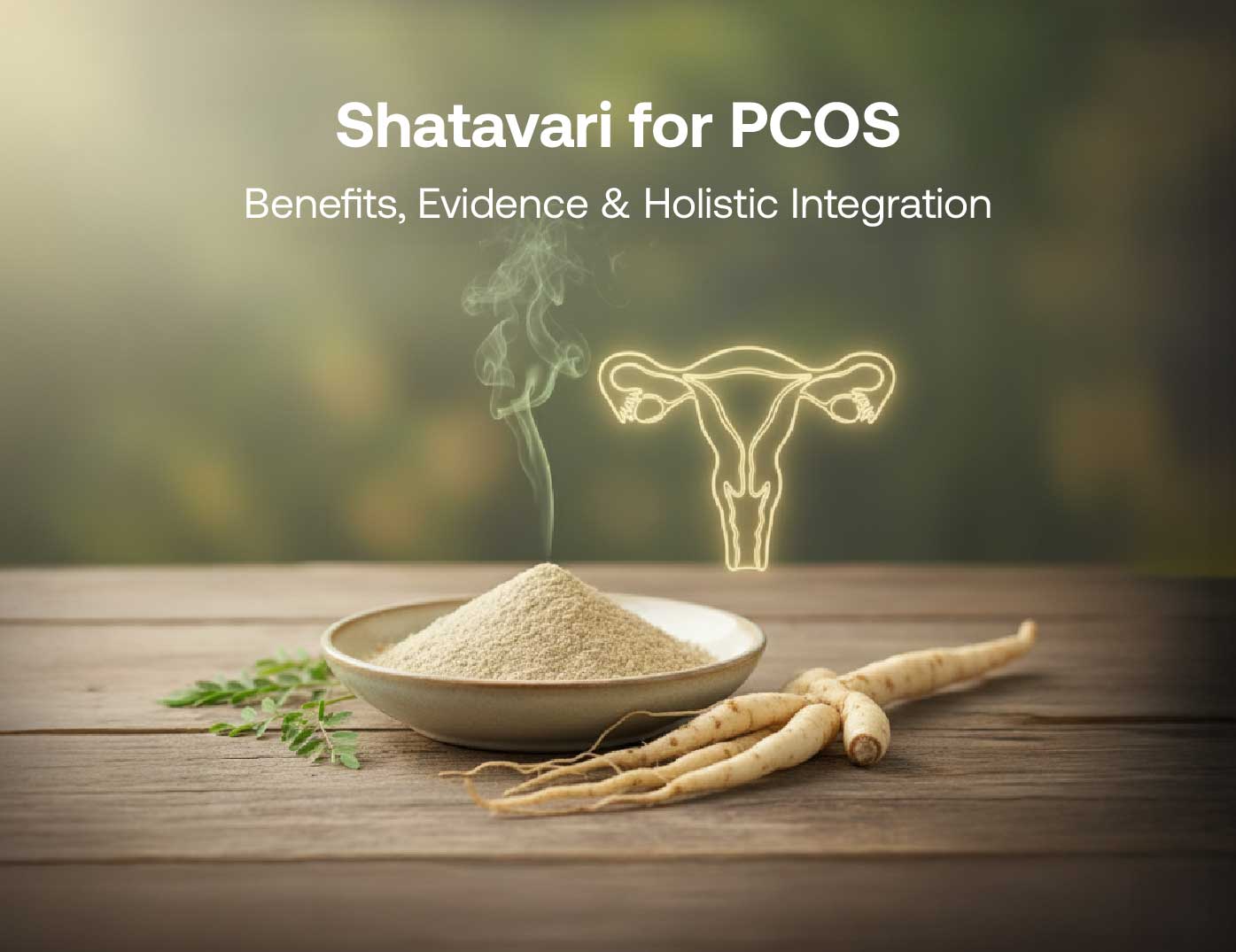Table of contents
The transition from perimenopause to menopause represents a pivotal moment in a woman's life. As hormonal changes affect physical and emotional well-being, many seek holistic ways to manage symptoms and maintain vitality. Ayurveda provides a comprehensive framework, emphasizing the balance of doshas and personalized wellness through herbal remedies, dietary habits, and mindful living. This article explores Ayurvedic strategies to support women during this important life phase.
Understanding Perimenopause and Its Challenges

Perimenopause is a complex transitional phase marked by significant hormonal fluctuations. Lasting several years leading up to menopause, this stage includes declining estrogen and progesterone levels, paired with shifting follicle-stimulating hormone (FSH) and antimüllerian hormone (AMH) levels. These changes contribute to symptoms that may include:
Hot flashes and night sweats
Mood swings, anxiety, or depression
Insomnia and brain fog
Joint pain and muscle aches [1]
From an Ayurvedic lens, this hormonal shift is closely tied to an imbalance in the Vata dosha, which governs movement, dryness, and instability. As estrogen declines, characteristics like dryness, anxiety, and erratic sleep can manifest more prominently, indicating Vata dominance [2].
Recognizing and addressing these symptoms early is key. Ayurveda recommends personalized self-care strategies such as:
A nurturing diet rich in healthy fats
Consistent sleep routines
Calming activities like yoga and meditation
Use of hormonal-balancing herbs [4]
The Role of Doshas in Menopause Transition

In Ayurveda, the life stages correspond to shifts in dosha dominance. During menopause, the transition typically shifts from Pitta (associated with transformation and fire) to Vata (associated with air and movement). This explains why symptoms such as dryness, anxiety, and restlessness become more prevalent [5], [6].
To counteract Vata's excesses, Ayurveda advises:
Warm, grounding, and cooked meals
Oil massages (Abhyanga)
Soothing herbal teas [7]
Conversely, imbalances in Pitta may cause irritability and hot flashes. Cooling foods and calming routines help soothe this fiery dosha [8], [9].
A woman can assess her doshic balance by regularly journaling her emotional and physical experiences, such as energy levels, appetite, and mood. This conscious tracking allows for targeted Ayurvedic interventions.
Ayurvedic Herbal Remedies for Menopausal Symptoms

Two of the most studied and trusted Ayurvedic herbs for supporting menopause are Shatavari (Asparagus racemosus) and Ashwagandha (Withania somnifera).
Shatavari
Known for its cooling and rejuvenating qualities, Shatavari has shown effectiveness in managing symptoms like hot flashes, vaginal dryness, and mood instability. A recent clinical trial demonstrated that daily supplementation with 250 mg of Shatavari extract significantly reduced a range of menopausal symptoms, with no adverse effects reported [10].
Ashwagandha
Renowned for its adaptogenic properties, Ashwagandha supports emotional resilience and hormonal regulation. An eight-week study showed notable improvements in vasomotor issues and psychological well-being after regular Ashwagandha use compared to placebo groups [11].
Though further research is warranted, combining these two herbs may offer synergistic benefits. They represent a scientifically supported, holistic approach for women seeking alternatives to conventional hormone therapy.
Lifestyle Changes to Support Hormonal Balance

Integrating Ayurvedic lifestyle practices can have a significant impact on managing menopause symptoms. These practices aim to regulate hormones and create inner balance:
Yoga and Meditation
- Yoga therapy helps alleviate hot flashes, mood swings, and insomnia [12], [13].
Forward bends and bridge pose stimulate endocrine function and balance hormonal production.
Meditation and mindfulness can stabilize mood, reduce stress hormones (like cortisol), and promote inner calm [14], [15].
Daily Practices
Maintain regular sleep cycles
Engage in moderate physical movement
Consume a balanced, seasonal whole-food diet
Incorporating these lifestyle changes not only counters hormonal imbalances but also contributes to overall emotional and physical well-being [16].
Nutritional Guidance for Menopausal Well-being

Ayurveda places strong emphasis on individualized dietary approaches to ease menopause. With the rise of Vata dosha during this phase, women benefit from consuming warm, moist, and nourishing foods such as:
Cooked grains (rice, barley)
Root vegetables (sweet potato, carrots)
Healthy fats (ghee, sesame oil) [6]
Additionally, Ayurveda supports the inclusion of:
Phytoestrogen-rich foods like flaxseeds, soy, and sesame seeds
Adaptogenic herbs such as Shatavari and Ashwagandha
Women are also advised to avoid processed foods, sugar, and excessive caffeine, instead favoring fresh, seasonal, and whole foods. Eating at regular intervals and focusing on lunch as the main meal supports digestive health and hormonal balance [18], [19].
Creating a Personalized Ayurvedic Action Plan

A personalized Ayurvedic plan considers your dominant dosha and the specific symptoms you are facing:
Vata: Nourishing, oily foods; calming routines
Pitta: Cooling foods; stress-reduction techniques
Kapha: Light, stimulating meals; increased activity [20], [21]
Complementing this plan with herbs, such as Shatavari for hormonal support and Ashwagandha for managing anxiety and fatigue, can further restore balance [2], [22].
Consulting an Ayurvedic practitioner helps tailor your plan to your needs and may include detox methods, lifestyle timing (Dinacharya), and Panchakarma therapies [23]. Also, surrounding yourself with a supportive community adds an emotional layer to the healing process [24].
Recommended Product
There is a growing selection of commercial menopause-support supplements leveraging these herbs. One example is Osh Wellness Menopause Support, which combines black cohosh, ashwagandha, and shatavari in clinically-informed dosages. Such products offer a convenient solution for those seeking natural relief from menopausal symptoms.
Conclusions

The menopausal journey can signify not an end, but a new beginning. By embracing Ayurvedic principles and recognizing the shifts in your body and mind, you can navigate this transition with grace. From customized diet and herbal supplementation to supportive lifestyle changes, Ayurveda offers an empowering path to well-being during these transformative years. Seeking guidance from skilled practitioners and nurturing daily rituals can go a long way in enhancing your health and vitality.
FAQs
What are the primary symptoms of perimenopause?
Hot flashes, irregular cycles, mood changes, sleep issues, and weight shifts are common early signs.
How can Ayurveda help during menopause?
Ayurveda balances doshas with herbs, diet, and lifestyle practices to ease symptoms and support long-term hormonal health.
Are there any side effects of Ayurvedic herbs?
Generally safe when used correctly, but quality, dosage, and individual constitution matter. Consult a qualified practitioner.
What dietary changes should one consider during menopausal transitions?
Favor warm, whole foods; add phytoestrogen-rich foods, healthy fats, and spices like turmeric; reduce caffeine and processed foods.
How long does it take to see results from Ayurvedic treatments?
Benefits are gradual, many notice changes in 4–12 weeks, depending on consistency and individual needs.
Sources
- Cleveland Clinic - Perimenopause
- One World Ayurveda - Doshas and Hormonal Health
- Harvard Health - The Rocky Road to Menopause
- NCBI - Ayurvedic Perspectives on Menopause
- Banyan Botanicals - Ayurvedic Menopause Guide
- Ayurvedic Practice - Menopause
- Purusha Ayurveda - Your Ayurvedic Dosha and Menopause
- JAIMS - The Role of Doshas in Menopause
- ClinicalTrials.gov - Shatavari for Menopausal Symptoms
- Nutritional Outlook - Ashwagandha for Post-Menopausal Women
- PMC - Yoga and Menopausal Symptoms
- Moreland OB/GYN - Yoga for Menopause
- Calm - Yoga for Menopause
- Quiet Blue - Yoga During Perimenopause
- NHS - Menopause Health Tips
- Deepam MediTours - Women's Hormonal Health
- Charak Ayurveda - Balancing Hormones Naturally
- The Ayurvedic Clinic - Menopause Guide
- Living Well Dallas - Ayurvedic Herbs and Rituals
- One World Ayurveda - Menopause in Ayurveda
- Saumya Ayurveda - Perimenopausal Transition
- 24: Kerala Ayurveda - Menopause with Ayurveda








